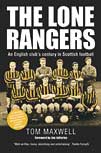 An English Club's Century in Scottish Football
An English Club's Century in Scottish Football
by Tom Maxwell
Northumbria Press, £17.99
Reviewed by Harry Pearson
From WSC 294 August 2011
Ninety per cent of the players in the club's history have come from another country, they play in a stadium – with "a sound system comparable to a Walkman in a bowl of soup" – that is overlooked by grain silos, one of their greatest ever players is the son of a shepherd, they are not allowed to play in their county cup competition for political reasons and they won their first ever football match by a margin of "one goal and two tries to nil".
All in all it is probably safe to say that Berwick Rangers are a singular football team. Indeed, the fact that they are an English club that plays in Scotland is in some ways one of the least remarkable things about them. Though as Tom Maxwell points out in this lively account of Rangers' many trials and tribulations, playing in a foreign land does place them in a small band of clubs that also includes Monaco, Wellington Phoenix and the Puerto Rico Islanders.
Since that first unusual victory over the Royal Oak back in Victorian times it is safe to say that the Shielfield Park side's history has never quite risen to the chequered, more it has been the plain-cloth of lower-league football the world over. There's been a narrow scrape here, a close call there, with every mention on national TV – even if it's a joke by Nick Hancock – squirrelled away by fans like a toothsome nut.
Aside from the Scottish Second Division title in 1979, a campaign masterminded by player-manager Dave Smith – compared to Bobby Moore and David Beckham by one excited local football reporter – and a famous 21-game unbeaten run under boss Jim Jefferies (working as an insurance broker in Coldstream at the time) that saw the club feature on Saint and Greavsie, Berwick's greatest moment was arguably the victory over those other, slightly better known, Rangers back in 1967. The player-manager on that occasion was Jock Wallace, a coach of such ferocious discipline that even his one act of kindness – allowing the players a slug of Scotch to warm them up before matches on cold days – has something of the bitter whiff of the battlefield about it.
Berwick's geographical location in an isolated corner of Northumberland, the clannish nature of Border society and the fact that the town has changed hands between England and Scotland 13 times give it a uniquely mixed-up character. This is perhaps best exemplified by the local accent, familiar to many via the TV appearances of Trevor Steven – who sold programmes at Shielfield as a teenager. Maxwell brings this unique place to life via personal recollections and interviews with fans and former players.
Sadly, or maybe not, there's nothing here that really explains why Rangers fans sing about "only living for sex and danger", unless of course it's the account of the career of John "Yogi" Hughes, whose reputation as a dressing-room joker seems to rest on his habit of biting his team-mates as they relaxed in the post-match bath.